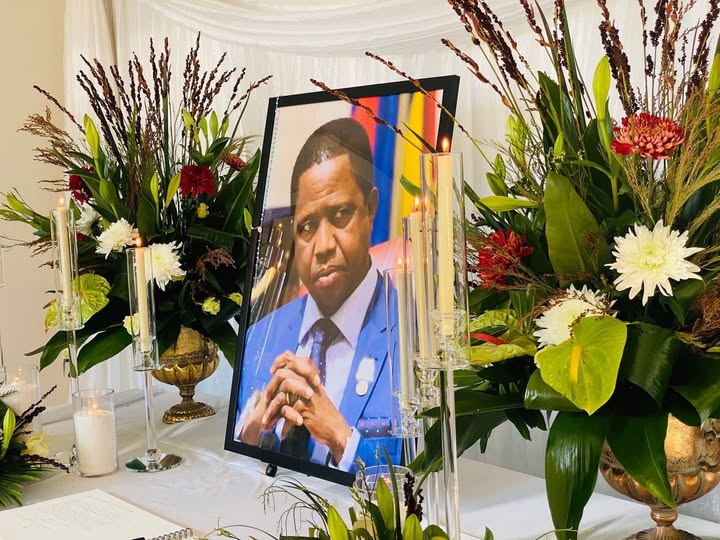News
“A Corpse Has No Rights,” Who Decides Where Edgar Lungu Is Buried?

The late Zambian president’s final resting place is now the centre of an international legal tug-of-war
What began as a farewell to a former head of state has turned into a transnational legal standoff. Edgar Lungu, Zambia’s sixth president, passed away in Pretoria on 5 June 2025. But where he will ultimately be laid to rest remains unresolved, following a bitter clash between his widow and the Zambian government. And now, the Gauteng High Court in Pretoria has found itself at the centre of the storm.
Family vs state: a battle for burial rights
After Lungu’s death, the Zambian government offered to repatriate his body for a state funeral. The family initially agreed, but things quickly soured. Tensions surfaced when it was revealed that Lungu allegedly made it clear he wanted no involvement from current President Hakainde Hichilema, even in death.
The family later accused the Zambian government of violating the funeral agreement and pivoted to a new plan: to bury Lungu in South Africa. The Pretoria court momentarily blocked the move. Then came another twist in August, when the court ruled that the body must return to Zambia. But Lungu’s widow was not done fighting.
The legal heart of the matter
Representing the family, renowned advocate Tembeka Ngcukaitobi presented an argument that struck at the core of personal rights versus state interest. According to him, the power to decide where a person is buried does not lie with governments or contracts. It lies with the next of kin.
“You cannot contract over human remains,” Ngcukaitobi told the court. “A corpse is not property. It has no legal rights.” The argument followed South African succession law, which stipulates that the widow holds the right to burial decisions unless incapacitated.
He warned that allowing a foreign state to enforce its laws within South African jurisdiction could dangerously weaken the constitutional protections South Africans rely on. Since Mrs Lungu resides in South Africa and brought the matter to a South African court, he argued, South African law must prevail.
Zambia pushes back
Zambia’s legal representative, Attorney-General Mulilo Kabesha, argued that Lungu remained a Zambian national, temporarily present in South Africa, and was still a figure of national significance. The state maintains that the funeral and burial must follow Zambian law and had already been contractually agreed upon.
Kabesha said the case was not about the body itself but the right to bury a national leader in accordance with the traditions and expectations of the country he once led. He further warned that no court could reasonably decide otherwise, even if South African law were applied.
“Once life ends, the rights also end”
Ngcukaitobi took the argument further by raising the issue of presidential benefits. Since Lungu died without those privileges restored, he claimed, the Zambian state could not treat him as a sitting or former president posthumously.
“You cannot reinstate benefits on a corpse,” he argued. “What they are doing now is an artificial construction of rights that no longer exist.”
In his view, the state was attempting to revive political relevance through a deceased leader. But in law, he insisted, the living determine how the dead are honoured, not governments seeking to save face.
What the public is saying
On social media, the story has struck a nerve. Some Zambians support the family’s stance, especially given the political friction between Lungu and the current administration. Others argue that Lungu, as a national figure, deserves a state funeral on home soil, regardless of personal wishes.
South African audiences have watched closely, with many commentators shocked at the complexity of international burial rights and the constitutional questions it raises. For lawyers and political observers alike, the case has opened up fascinating debates about sovereignty, dignity, and succession law.
Final word still pending
As it stands, the judgment has been reserved, meaning Lungu’s body remains in South Africa and in limbo. His widow, steadfast in her claim, continues to fight for the right to honour her husband’s final wishes. The Zambian state, equally resolute, insists those wishes do not outweigh the rights of a nation.
What’s certain is that this case is no longer just about where one man is buried. It’s about who decides the fate of the dead when the living no longer agree.
Also read: Behind the Headlines: Why Lesufi and Motara Are Not at Odds on Informal Settlements
Follow Joburg ETC on Facebook, Twitter, TikT
For more News in Johannesburg, visit joburgetc.com
Source: The Citizen
Featured Image: Facebook/Diamond TV Online



























